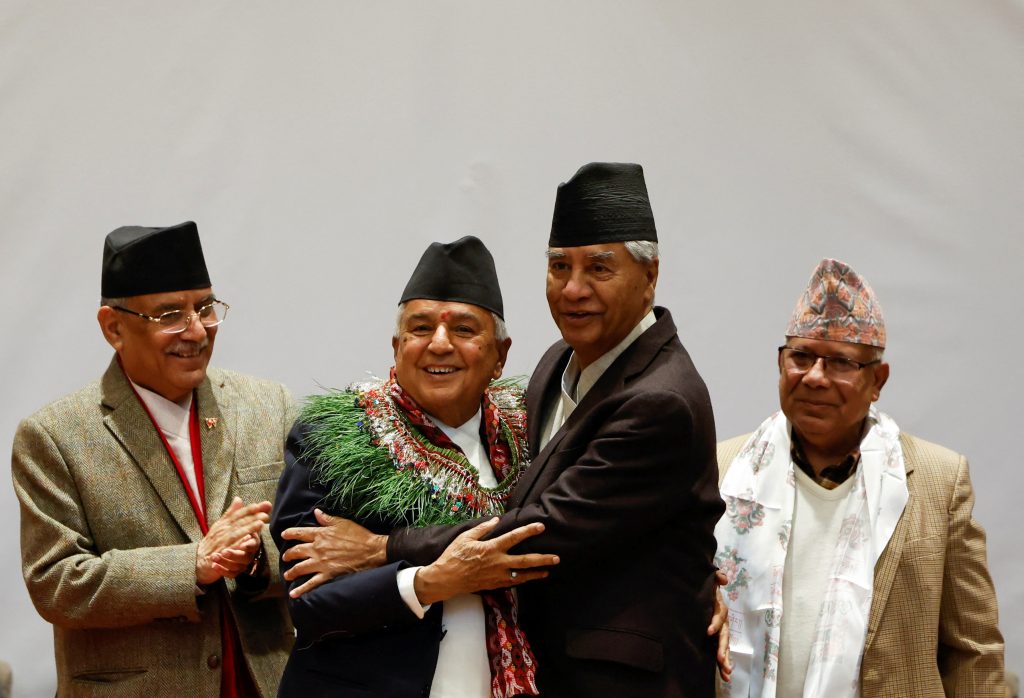In the aftermath of the November 2022 elections, Nepali Prime Minister Pushpa Kamal Dahal secured 268 out of 270 votes in the parliament, backed by the Communist Party of Nepal (Unified Marxist–Leninist) (CPN-UML) in January 2023. But cracks in the coalition soon emerged, compelling Dahal to seek another vote of confidence with the Nepali Congress’s support in March.
By the end of 2023, Dahal seemed intent on protecting his position, making deals with everyone who mattered. The parliament passed only one piece of legislation in 2023, leaving the many pieces of law which have been waiting parliamentary discussions and approval since July 2019.
Despite Dahal’s Communist Party of Nepal (Maoist Centre) holding a mere 32 seats, he navigated political waters alongside coalition partners, including Nepali Congress President Sher Bahadur Deuba and fair-weather friend Khadga Prasad Sharma Oli of the CPN-UML. Dahal, Deuba and Oli make up the trio of septuagenarian leaders at the helm of a country in which 50 per cent of its population is under 25 and 70 per cent under 40.
This ‘big three’ handle all serious matters, sporadically divulging proceedings through ‘sources’. This practice has sparked criticism for protecting corrupt people, promoting nepotism, favouritism and ‘bhagbanda’ (distribution of power and perks amongst the group).
Political instability has been the only constant for Nepal and 2024 will not see anything different. Independent parties and candidates wait for the 2027 elections, as Nepalis recognise the impact of independent mayors like Balendra Shah of Kathmandu and Harka Sampang of Dharan. Internationally educated parliamentarians like Sumana Shrestha from the Rastriya Swatantra Party are developing a huge following by asking unprecedented questions in the parliament. These parliamentarians are contributing through initiatives like developing a parliamentary calendar, engaging the Nepali diaspora and hosting a ‘Bill Hackathon’ that solicited public participation in designing legislation.
Nepal witnessed large-scale scams in 2023, with their legal outcomes dependent on whether they were under the protection of the ‘Big 3’. In a fake Bhutanese refugee scam, former home minister and Deuba’s confidant, Bal Krishna Khand, was among many convicted for swindling millions from Nepalis under the false promise of settling them in the United States as Bhutanese refugees. The Lalita Niwas scam, which involved the sale of government-owned land resulted in two former prime ministers — Madhav Kumar Nepal and Baburam Bhattarai — being indicted.
Multiple gold smuggling scams were exposed when pre-arranged deals cracked. The Ncell scam involved 80 per cent of the shares of Ncell Axiata — the largest private telecom operator — being transferred to a Nepali owner based in the United Kingdom. Axiata, in its exit memo, had scathing remarks about Nepal’s business and political environment.
Compared to 2022, macroeconomic indicators continued to look positive in 2023. Real GDP grew by 1.86 per cent, inflation remained stable at 7.74 per cent, foreign exchange reserves increased by 27.4 per cent to 1345 billion Nepali rupees (NRs 1345 billion, or US$10.12 million). Balance of payments turned from a deficit to a surplus of NRs 290 billion (US$2.1 billion) and there was a large increase of 21.2 per cent in remittances to NRs 1220 billion (US$9.1 billion).
The Nepali rupee, starting at NRs 132.45 on 1 January 2023 ended at NRs 133.10 against the dollar due to a strong Indian rupee. The Nepali rupee has been pegged to the Indian rupee at NRs 1.60 for 1 Indian rupee since 1994.
Nepal also welcomed one million touristsin 2023, marking a post-COVID-19 record. International travel rose by 41 per cent, while domestic travel increased by 38 per cent.
Nepalis continued to migrate for education and jobs in 2023. During the fiscal year 2022–23, 110,217 students obtained No Objection Certificates from the Government of Nepal that allowed them to study abroad. Over 800,000 people secured labour permits in 2022, with an additional 300,000 permits issued in the first five months of the 2023–24 fiscal year. Remittances soared to US$9.33 billion according to the Nepal Rastra Bank with an equal amount of informal remittances.
On 29 November 2023, following an interim Supreme Court ruling, Nepal became the second Asian country to register its first same-sex marriage. Yet Nepal grappled with its secular identity after tensions escalated over issues associated with the slaughter of cows and the Muslim-Hindu conflict, in places like Dharan and Nepalgunj.
On 3 November 2023, an earthquake killed 153 people and destroyed hundreds of buildings. While landslides and other natural calamities continue to impact Nepal, the plight of the earthquake-affected locals in Bajura, who are struggling to face the cold in makeshift tents, raises concerns about the country’s preparedness.
Nepal attracted increased geopolitical attention with the Millenium Challenge Corporation compact work in full swing, along with increased support from the United States. Dahal visited India, the United States and China in 2023.
A pilot project to export 40 MW of power to Bangladesh through India will open up a corridor for energy exports to multiple countries. The Pokhara International Airport — built with Chinese financing — was opened on 1 January 2023 but has not seen its capacity utilised due to India not opening routes to the Pokhara and Bhairawa airports.
Nepal must adeptly navigate its geopolitical challenges — especially with China, India and the United States — in order to sell its hydropower to regional markets, welcome more tourists and ensure job creation to stem migration.
Sujeev Shakya is founding CEO of Kathmandu-based consulting firm Beed Management, Senior Advisor for Nepal and Bhutan at BowerGroupAsia and Chair of the Nepal Economic Forum.
This article is part of an EAF special feature series on 2023 in review and the year ahead.


Nepal experienced political instability in 2023. Macroeconomic indicators improved and independent politicians gained traction ahead of the 2027 elections. Despite a series of major scams and ongoing issues such as increasing natural disasters, soaring emigration for education and work and growing religious conflict, there were positive developments including the registration of the country's first same-sex marriage and a rebound in both international and domestic travel.